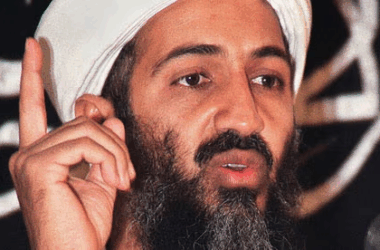Osama bin Laden, as the architect of some of the most devastating terrorist attacks in modern history, etched an indelible mark upon global security. Before his time, terrorism was more localized and less threatening, but his extremist views, masterful organization, and videotaped ruthlessness changed the nature of terrorism to that of a worldwide threat. This article unpacks how the bin Laden ideology, the foundation of al-Qaeda, and the attacks of 9/11 transformed modern terrorism—and why he remains a force long after his death.

1. Bin Laden’s Radical Beliefs: The Roots of Modern Extremism
The religious views of Osama bin Laden were extremely radical. His Eye-of-God perception of the West, especially the United States, was that it was an enemy of Islam; hence a violent kind of jihad had to be waged against it. Through speeches and writings, his terroristic acts were considered a religious obligation, convincing most of the followers to accept his extremist viewpoint.
Due to this approach to politics and terrorism, the message of Bin Laden found resonance outside the borders of the Middle East in places where malcontents reside- Europe, Asia, and Africa. This transformation of terrorism into a worldwide issue was intended by his very political rhetoric. The ideology then became a blueprint for subsequent jihadist groups operating around the world, inciting attacks worldwide.
Key Points:
- Bin Laden held that the U.S. and its allies represented enemies of Islam.
- His call for violent jihad wrenched thousands into the appeal of terrorism.
- His ideology spread worldwide and influenced extremists everywhere.
2. Al-Qaeda: The First Global Terror Network
Bin Laden founded al-Qaeda in the late 1980s, an organization with a new concept of terrorism. Any militant before this considered operations active within one country. Al-Qaeda was truly international in scope and aimed to unite extremists from different nations under one umbrella.
Al-Qaeda employed modern technology: satellite phones, encrypted messages, and internet propaganda for recruitment and planning of attacks. Training camps in Afghanistan became places to teach militancy, bomb-making, guerrilla tactics, and suicide techniques. Bin Laden’s view elevated terrorism to a challenge of the world on international scale, forcing governments to reconsider their security strategies.
Key Points:
- Training camps in Afghanistan produced many militants over the years.
- Al-Qaeda was the very first global terrorist organization.
- It used modern communication means to coordinate attacks.
READ MORE: Operation Sindoor 2025 | India’s Bold Strike Against Terrorism
3. 9/11: The Day That Changed Everything
9/11 represents the most devastating terrorist train ever.
It led to the War on Terror and military interventions.
Security measures across the world changed forever.
On September 11, 2001, al-Qaeda led by bin Laden executed the most devastating terrorist act in history, with nineteen hijackers killing almost 3,000 people by crashing planes into the World Trade Center, the Pentagon, and a field in Pennsylvania.
The attack provided shock to the world and ushered in the War on Terror led by the U.S., which included the invasions of Afghanistan and Iraq. Governments around the globe started fortifying security with tight airport screening procedures, mass surveillance, anti-terrorist laws, etc. Bin Laden showed that even superpowers were susceptible and changed the entire landscape of world politics for the next several decades.
Key Points:
- 9/11 was the deadliest terrorist act in history.
- The act also gave birth to the War on Terror and set into motion the biggest military interventions.
- World-wide measures for security changed forever.
4. The Legacy of Bin Laden: Terrorism after His Death
Even with bin Laden’s death in 2011, his impact continued unabated. Al-Qaeda fragmented into regional factions, while ISIS emerged as the next more violent expresser of this. Most of the ISIS leaders came from the ranks of al-Qaeda, indicating that bin Laden’s ideology was alive.
Beyond organized groups, his rhetoric inspired lone-wolf attacks: attacks carried out by individuals without direct orders. From the Boston Marathon bombing to the Charlie Hebdo attacks, extremists continued acting in his name. It is a legacy governments remain struggling to contain as they seek to maintain a balance between security and civil liberties.
Key Points:
- Al-Qaeda’s influence evolved into groups like ISIS.
- Lone-wolf attackers remain a persistent threat.
- Counterterrorism efforts continue to adapt.
READ ALSO: Is Starlink Internet the Key to Connecting the World?
Conclusion: A Shadow That Still Looms
Osama bin Laden’s impact on global terrorism is undeniable. His radical beliefs, creation of al-Qaeda, and the 9/11 attacks redefined security and warfare. Though he is gone, the fear, policies, and extremist movements he inspired remain.
Understanding his role helps us recognize the ongoing threat of terrorism—and the need for vigilance in an unstable world.
Final Thoughts:
- The fight against terrorism remains a critical challenge.
- Bin Laden transformed terrorism into a global phenomenon.
- His legacy continues to influence extremist groups.
FAQs
1. Who was Osama bin Laden?
Osama bin Laden was the founder of al-Qaeda, a global terrorist group. He is best known for planning the 9/11 attacks on the United States.
2. What was Osama bin Laden’s main goal?
His goal was to remove Western influence from Muslim countries and establish Islamic rule, using violent jihad as a method.
3. How did Osama bin Laden change terrorism?
He transformed terrorism into a global network, using modern tools to spread radical ideas and carry out large-scale attacks across borders.
4. What impact did the 9/11 attacks have?
The 9/11 attacks led to the global “War on Terror,” increased security worldwide, and military actions in countries like Afghanistan and Iraq.
5. Is al-Qaeda still active today?
Yes, al-Qaeda is still active in parts of Africa, the Middle East, and Asia. Its ideology continues to inspire other terrorist groups and individuals.











